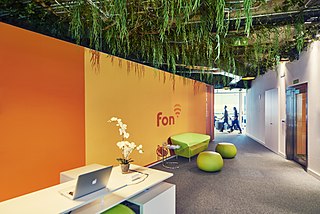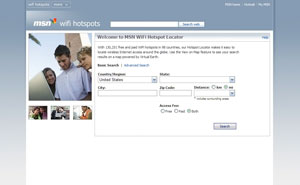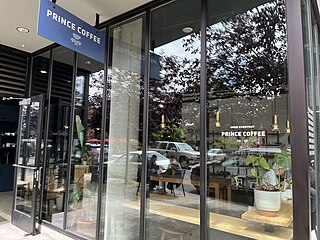
Wireless community networks or wireless community projects or simply community networks, are non-centralized, self-managed and collaborative networks organized in a grassroots fashion by communities, non-governmental organizations and cooperatives in order to provide a viable alternative to municipal wireless networks for consumers.

Wi-Fi is a family of wireless network protocols based on the IEEE 802.11 family of standards, which are commonly used for local area networking of devices and Internet access, allowing nearby digital devices to exchange data by radio waves. These are the most widely used computer networks in the world, used globally in home and small office networks to link devices together and to a wireless router to connect them to the Internet, and in wireless access points in public places like coffee shops, hotels, libraries, and airports to provide visitors with Internet connectivity for their mobile devices.

Wardriving is the act of searching for Wi-Fi wireless networks, usually from a moving vehicle, using a laptop or smartphone. Software for wardriving is freely available on the internet.

MobileStar Network was a wireless Internet service provider which first gained notability in deploying Wi-Fi Internet access points in Starbucks coffee shops, American Airlines Admiral Club locations across the United States and at Hilton Hotels. Founded by Mark Goode and Greg Jackson in 1998, MobileStar was the first wireless ISP to place a WiFi hotspot in an airport, a hotel, or a coffee shop. MobileStar's core value proposition was to provide wireless broadband connectivity for the business traveler in all the places s/he was likely to "sleep, eat, move, or meet." MobileStar's founder, Mark Goode, was the first to coin the now industry standard expression "hotspot," as a reference to a location equipped with an 802.11 wireless access point.

A hotspot is a physical location where people can obtain Internet access, typically using Wi-Fi technology, via a wireless local-area network (WLAN) using a router connected to an Internet service provider.
Adam Shand is a New Zealand visual effects operations manager and advocate of community wireless networks.

Fon Wireless Ltd. is a for-profit company incorporated and registered in the United Kingdom that provides wireless services. Fon was founded in Madrid, Spain, in 2006, by Martín Varsavsky where it headquarters most of its operations.

Google WiFi is a municipal wireless network deployed in Mountain View, California. It is entirely funded by Google and installed primarily on Mountain View lightposts. Google had committed to keeping the service free until 2010. The initial service was shut down by Google on May 3, 2014 at their Mountain View base, and provided a new public outdoor WiFi.

A municipal wireless network is a citywide wireless network. This usually works by providing municipal broadband via Wi-Fi to large parts or all of a municipal area by deploying a wireless mesh network. The typical deployment design uses hundreds of wireless access points deployed outdoors, often on poles. The operator of the network acts as a wireless internet service provider.

Tethering or phone-as-modem (PAM) is the sharing of a mobile device's Internet connection with other connected computers. Connection of a mobile device with other devices can be done over wireless LAN (Wi-Fi), over Bluetooth or by physical connection using a cable, for example through USB.

MSN WiFi Hotspots, previously Windows Live WiFi Hotspot Locator, was a website that helped users to locate wireless Internet hotspots worldwide and view their positions on a map using Live Search Maps.

MetroFi was a provider of municipal wireless network service in several cities in the western United States.

Founded in 2002, WiFiFee, LLC. is a Wi-Fi broadband internet access provider, based in Menands, New York. WiFiFee specializes in providing high-speed wireless Wi-Fi Internet access to end-users at residential communities (MDU/MTU), hotels, condominiums, resorts, RV Parks, airports and shopping malls.
Village Telco is an initiative to build low-cost community telephone network hardware and software. It is based on a suite of open-source applications that enable entrepreneurs to set up and operate a telephone service in a specific area or supporting the needs of a specific community.

The city of Minneapolis, Minnesota, is covered by a citywide broadband wireless internet network, sometimes called Wireless Minneapolis. The network was first proposed in 2003, at which point only a few other cities nationwide had such systems in place. Local firm US Internet beat out EarthLink to build and operate the network, with a guaranteed ten-year, multimillion-dollar contract from the city itself as the network's anchor tenant. Construction began on the project in 2006, but encountered several delays. Most of the city was covered by the network by 2010, and USI Wireless, the subsidiary of US Internet responsible for the system, set up numerous free internet access points at public locations around Minneapolis.
The Cloud is a provider of public access Wi-Fi hotspots in the United Kingdom and is a member of the Wireless Broadband Alliance. It has over 22,000 Wi-Fi hotspots network access points in the UK.

BharatNet, also known as Bharat Broadband Network Limited (BBNL), is a central public sector undertaking, set up by the Department of Telecommunications, a department under Ministry of Communications of the Government of India for the establishment, management, and operation of the National Optical Fibre Network to provide a minimum of 100 Mbit/s broadband connectivity to all 250,000-gram panchayats in the country, covering nearly 625,000 villages, by improving the middle layer of nation-wide broadband internet in India to achieve the goal of Digital India.

Southeast Grind was a coffeehouse in Portland, Oregon's Hosford-Abernethy neighborhood, in the United States. Opened by owner Kacey Birch in 2009, Southeast Grind was the city's only coffee shop operating 24 hours a day, as of 2019. Besides coffee and espresso drinks, the coffeehouse served juices, smoothies, teas, pastries, quesadillas, salads, sandwiches, and other snacks. Southeast Grind was described as a "safe, reliable spot", a "living room", and a "respite" for a diverse clientele, especially students. It closed in October 2019 because of lease issues, renovations required to address the building's structural problems and Birch's desire to focus on family.

Prince Coffee is a coffee shop in Portland, Oregon, United States.
















